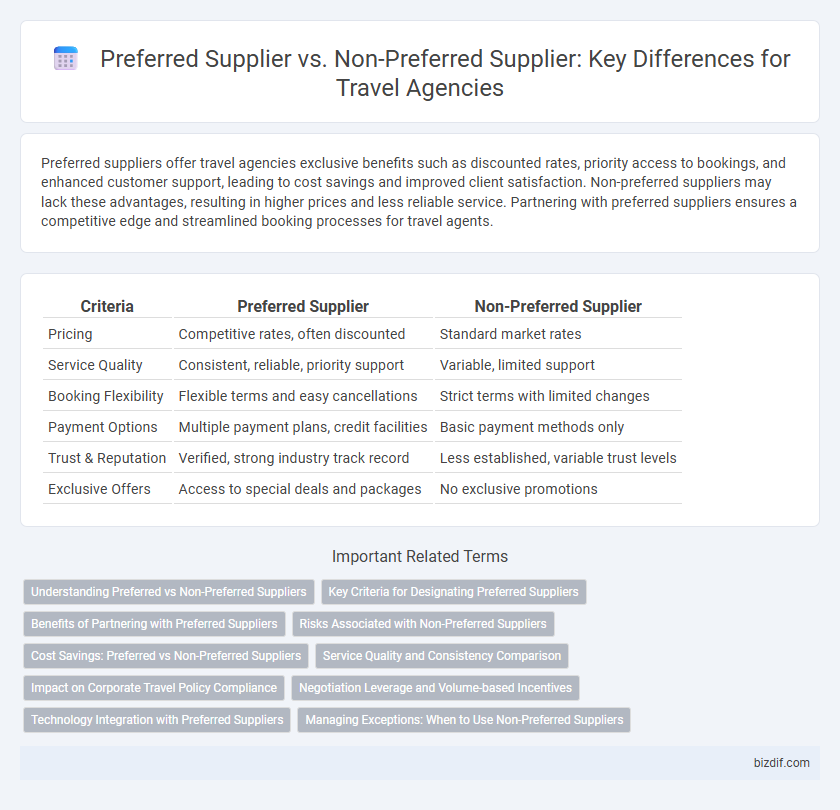Preferred suppliers offer travel agencies exclusive benefits such as discounted rates, priority access to bookings, and enhanced customer support, leading to cost savings and improved client satisfaction. Non-preferred suppliers may lack these advantages, resulting in higher prices and less reliable service. Partnering with preferred suppliers ensures a competitive edge and streamlined booking processes for travel agents.
Table of Comparison
| Criteria | Preferred Supplier | Non-Preferred Supplier |
|---|---|---|
| Pricing | Competitive rates, often discounted | Standard market rates |
| Service Quality | Consistent, reliable, priority support | Variable, limited support |
| Booking Flexibility | Flexible terms and easy cancellations | Strict terms with limited changes |
| Payment Options | Multiple payment plans, credit facilities | Basic payment methods only |
| Trust & Reputation | Verified, strong industry track record | Less established, variable trust levels |
| Exclusive Offers | Access to special deals and packages | No exclusive promotions |
Understanding Preferred vs Non-Preferred Suppliers
Preferred suppliers in the travel industry are vetted partners offering exclusive rates, reliable services, and prioritized booking options, enhancing customer satisfaction and operational efficiency. Non-preferred suppliers lack formal agreements, leading to variable pricing and inconsistent service quality that can impact travel planning and budget control. Understanding the distinction helps agencies optimize vendor relationships, secure competitive pricing, and ensure seamless travel experiences for clients.
Key Criteria for Designating Preferred Suppliers
Key criteria for designating preferred suppliers in a travel agency include consistent service quality, competitive pricing, and reliability in booking fulfillment. Preferred suppliers demonstrate strong partnerships through timely communication, flexible cancellation policies, and positive client feedback. Agencies prioritize suppliers offering exclusive deals, comprehensive inventory, and robust support systems to enhance customer satisfaction and streamline operations.
Benefits of Partnering with Preferred Suppliers
Partnering with preferred suppliers ensures access to exclusive rates, superior service quality, and reliable availability, enhancing customer satisfaction and boosting revenue. Preferred suppliers often provide tailored packages, priority support, and collaborative marketing opportunities, which streamline operations and optimize cost efficiencies. Establishing strong relationships with preferred suppliers leads to consistent performance standards and competitive advantages in the travel industry.
Risks Associated with Non-Preferred Suppliers
Non-preferred suppliers in the travel industry often pose significant risks including inconsistent service quality, limited reliability, and potential compliance issues, which can compromise client satisfaction and safety. Using non-preferred suppliers increases exposure to unverified pricing, lack of contractual protections, and difficulties in dispute resolution, impacting overall profitability and reputation management for travel agencies. Travel agencies must carefully assess these risks to maintain operational efficiency and client trust.
Cost Savings: Preferred vs Non-Preferred Suppliers
Preferred suppliers often provide travel agencies with exclusive discounts, negotiated rates, and bundled offers that significantly reduce overall travel costs compared to non-preferred suppliers. These cost savings stem from long-term partnerships and volume commitments, which non-preferred suppliers typically cannot match. Utilizing preferred suppliers enables agencies to offer competitive pricing to clients while maintaining higher profit margins.
Service Quality and Consistency Comparison
Preferred suppliers consistently deliver higher service quality through proven reliability, prompt issue resolution, and adherence to agreed standards, ensuring a seamless travel experience. Non-preferred suppliers exhibit variable service levels, often leading to unexpected delays, inconsistent communication, and lower customer satisfaction rates. Travel agencies prioritize preferred suppliers to maintain consistent service excellence, streamline operations, and build long-term client trust.
Impact on Corporate Travel Policy Compliance
Preferred suppliers ensure higher compliance with corporate travel policies by offering negotiated rates, consistent service quality, and streamlined booking processes. Non-preferred suppliers may lead to policy deviations, increased costs, and fragmented expense tracking, complicating financial oversight. Utilizing preferred suppliers supports corporate objectives of cost control, risk management, and traveler safety adherence.
Negotiation Leverage and Volume-based Incentives
Preferred suppliers offer travel agencies significant negotiation leverage due to higher booking volumes, enabling agencies to secure better pricing, exclusive deals, and enhanced service terms. Volume-based incentives from preferred suppliers motivate agencies to channel more business their way, resulting in cost savings and improved profitability. Non-preferred suppliers lack this leverage and typically provide less competitive rates and fewer incentives, limiting the agency's ability to maximize revenue and client value.
Technology Integration with Preferred Suppliers
Preferred suppliers in travel agencies often offer advanced technology integration, enabling seamless booking, real-time inventory updates, and direct API connectivity that enhances operational efficiency. These integrations facilitate automated workflows, reduce manual errors, and improve customer experience through instant confirmations and personalized offers. Non-preferred suppliers typically lack such robust tech solutions, resulting in slower processes and limited access to dynamic content.
Managing Exceptions: When to Use Non-Preferred Suppliers
Managing exceptions in travel requires strategic use of non-preferred suppliers when preferred options are unavailable due to capacity constraints or cost inefficiencies. Travel agencies must evaluate factors such as service quality, reliability, and client-specific needs before integrating non-preferred suppliers to maintain customer satisfaction. Utilizing non-preferred suppliers selectively ensures flexibility while preserving contractual benefits and operational standards established with preferred suppliers.
Preferred supplier vs Non-preferred supplier Infographic

 bizdif.com
bizdif.com